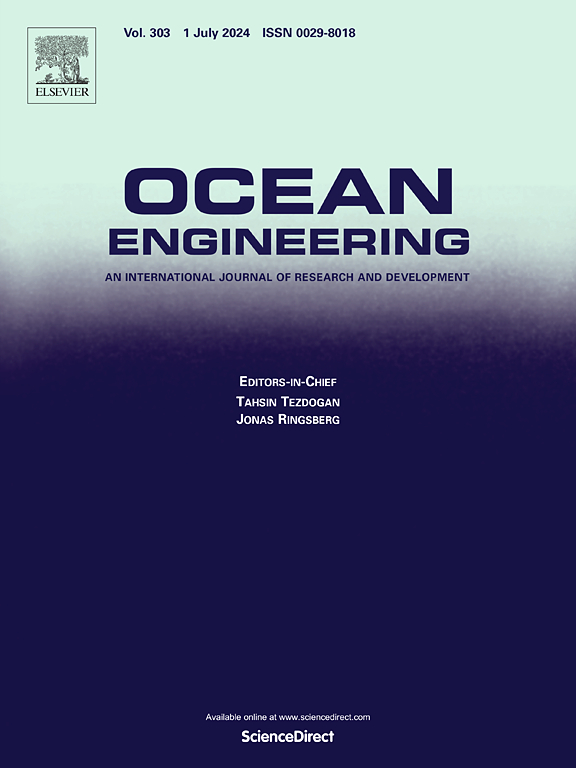具有宽带捕获性能的内置双稳机构波能转换器发电特性的实验研究
IF 4.6
2区 工程技术
Q1 ENGINEERING, CIVIL
引用次数: 0
摘要
波浪能作为一种连续可靠的动力源,已成为近海海洋浮标的重要动力来源。然而,它的有效利用受到入射波频率变化的影响,这影响了传统波浪能转换器(WECs)的整体发电性能。因此,提出了一种基于双稳态机制的宽带捕获特性的内嵌式WEC (BM-WEC)来适应波的时空波动。通过数值模拟和物理实验对发电性能进行了分析,揭示了结构参数、弹簧刚度和阻尼系数阶跃变化对运动响应和电输出的影响,开发了提高大功率输出的优化流程。结果表明,在规则波条件下(ω = 1 ~ 4 rad/s), BM-WEC的捕获带宽比单一固有频率的传统WEC宽13.47%,累计输出功率提高57.24%。此外,在不规则波浪条件下,该带宽优势提高到19.05%,证明了自供电浮标技术是一种实用可行的解决方案。本文章由计算机程序翻译,如有差异,请以英文原文为准。
Experimental study on power generation characteristics of a built-in bistable mechanism wave energy converter with broadband capturing performance
Wave energy, as a continuous and reliable power source, has attracted significant attention for powering offshore marine buoys. However, its effective utilization is affected by varying incident wave frequencies, which compromises the overall power generation performance of traditional wave energy converters (WECs). Therefore, a built-in WEC based on a bistable mechanism (BM-WEC) with broadband capture characteristics is proposed to accommodate temporal and spatial fluctuations of waves. The power generation performances were analyzed through numerical simulations and physical experiments, revealing the effects of structural parameters and step changes in spring stiffness and damping coefficient on motion response and electrical output, developing an optimization process to enhance high-power output. Results show that the BM-WEC achieves a captured bandwidth 13.47 % wider than that of a conventional WEC with a single natural frequency under regular wave conditions (ω = 1–4 rad/s), with cumulative output power increased by 57.24 %. Furthermore, this bandwidth advantage increases to 19.05 % under irregular wave condition, demonstrating that it is a practical and feasible solution for self-powered buoy technology.
求助全文
通过发布文献求助,成功后即可免费获取论文全文。
去求助
来源期刊

Ocean Engineering
工程技术-工程:大洋
CiteScore
7.30
自引率
34.00%
发文量
2379
审稿时长
8.1 months
期刊介绍:
Ocean Engineering provides a medium for the publication of original research and development work in the field of ocean engineering. Ocean Engineering seeks papers in the following topics.
 求助内容:
求助内容: 应助结果提醒方式:
应助结果提醒方式:


